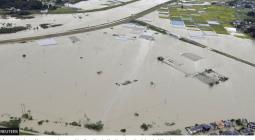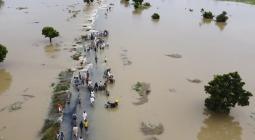Rishi Sunak under fire after week of devastating flooding across England
PM insists government is responding, as some residents are told to expect five more days of misery and colder weather
Large swathes of England ended the week devastated by flood water as rivers reached record highs, provoking a bitter political row over funding for the country’s most vulnerable areas.
Labour accused Rishi Sunak of being “asleep at the wheel” over flood warnings at the end of a week in which at least 1,000 properties were flooded and some villages were totally cut off, with parts of Nottinghamshire, Shropshire, Gloucestershire and Wiltshire worst affected.
The Environment Agency (EA) in England blamed the floods on the climate crisis as it advised people in flood risk areas to turn off gas, water and electricity supplies, take possessions upstairs, and move family, pets and cars to safety.
Though the rain is forecast to subside over the weekend, temperatures are likely to plummet, causing more misery for those trying to clean up their homes and businesses after the deluge.
Flood-hit residents were warned to brace themselves for five more days of misery because the ground was “completely saturated”, the EA said.
Hundreds of flood warnings and alerts remained in place across England and Wales on Friday evening with the UK Health Security Agency (UKHSA) issuing a cold weather alert from Saturday.
This winter the National Audit Office revealed that the number of properties to receive better protection from flooding by 2027 had been cut by 40%, and 500 of 2,000 new flood defence projects had been abandoned.
The prime minister was booed on Friday as he left a cafe in Marple, Stockport, after talking to activists in the marginal Tory-Lib Dem constituency of Hazel Grove.
Those heckling him called on him to resign, although not necessarily because of his handling of the floods. But Sunak insisted his government had a grip on flooding after Labour said it would convene a Cobra-style flood resilience taskforce to help protect vulnerable areas, with Sir Keir Starmer vowing to make flood defences “fit for purpose”.
It was “not about extra money” but “ensuring that the budget already committed to flood defences is used to maximum effect”, said Labour.
Sunak rejected criticism, saying: “The Environment Agency have people in the ground everywhere, absolutely recognise the urgency of what is happening and they are responding appropriately and with all due haste.”
He ignored calls from the Liberal Democrats to visit flood-hit areas himself, but sent the junior environment department minister, Robbie Moore to Nottingham, where many properties by the River Trent were evacuated.
Moore told reporters the EA was “working incredibly hard” and that the government was spending £5.2bn over the “next cycle” to “better protect homes that have been impacted by these consequences”.
He said local authorities could go “a lot further” when scrutinising planning applications by taking into account the impact of flooding.
Labour said that despite the government doubling its budget for flood defence, the number of properties protected from flooding would rise by just a fifth.
Talking by the Trent, the EA spokesperson Alex McDonald said: “We are feeling the effects of climate change in the east Midlands, and as a nation we need to be more resilient to flooding.”
This week the Guardian and Greenpeace reported that the proportion of vital flood defences in disrepair had almost trebled in the West Midlands and the east of England since 2018, leaving thousands of homes and businesses more vulnerable to storms.
Councillor Paul Taylor, the portfolio holder for public protection at Newark and Sherwood district council, said “massive” investment was needed in flood protection but the immediate priority was helping and protecting local people.
He said: “Some villages are cut off. We’re finding that we are having to help people get medication because they can’t get out of their villages – a whole range of things.
“This is the third time in as many months that we’ve had issues with flooding.”
Train routes were also affected by the deluge. Great Western Railway said several lines remain closed because of flooding, including between Swindon and Bristol Parkway, Reading and Castle Cary, and Liskeard and Looe in Cornwall.
Flooding closed many local roads, especially in the west of England, while on the major road network, the A421 in Bedfordshire between the M1 motorway and the A6 was impassable on Friday. National Highways said work was being carried out to clear the flood water.
The highest rainfall totals recorded on Thursday were 35.2mm at Otterbourne in Hampshire, with a wide range of 20mm-30mm across much of the southern counties of England.
In a joint statement on Friday, the shadow Cabinet Office minister, Pat McFadden, and the shadow environment secretary, Steve Reed, said ministers had ignored a warning from the National Audit Office in November that said the government was failing to deliver on its commitments to better protect homes against flooding.
They wrote: “Rishi Sunak has been asleep at the wheel and he must act now or risk further damage to lives and livelihoods. This is not about extra money. This is about ensuring that the budget already committed to flood defences is used to maximum effect. If that doesn’t happen, homes across the country will remain exposed.”
The EA said “significant river flooding impacts” were expected on Saturday across parts of the Midlands on the River Trent and in Gloucester, with 250 flood warnings in place across much of the Midlands and south of England.
It said areas of the south-west on the River Avon would also be affected, adding that continuing impacts were likely across much of England over the next five days because the ground was “completely saturated”.
EA data showed almost every river in England to be exceptionally high, with some rivers reaching their highest flow on record, such as the River Itchen in Southampton, which saw a flow double its previous record in December.
The UK Health Security Agency has issued a yellow cold weather alert from 9am on Saturday until 12pm on 12 January.
One expert said the UK should expect more wet winters due to climate change.
Dr Emily Wallace, a Met Office fellow in climate extremes, said: “In the future, climate projections for the UK indicate there being a greater risk of heavy precipitation and prolonged events in the future, particularly during winter.”
Cover photo: A man uses his kayak to cross flooded meadows in Henley-on-Thames. Photograph: Toby Melville/Reuters





